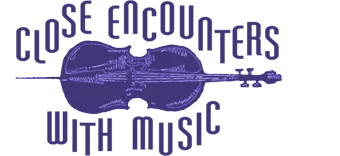Beautiful, Horrible: A Close Encounter with Vadim Gluzman and Angela Yoffe by Jason Victor Serinus
Me: “How long have you two been together?”
Yoffe: “Too long.”
Me: ‘What is it like when the two of you practice? Do you fight a lot?”
Yoffe: “It’s beautiful.”
Gluzman: “It’s horrible.”
So began an oft-hilarious chat with the husband-wife team of violinist Vadim Gluzman and pianist Angela Yoffe. Hopefully you don’t have to share their Russian Jewish ancestry to understand that at the heart of such self-deprecating humor are two artists so united in their love for music, family, and each other that they do all they can to stay together whenever they go on the road to perform
“Our daughter Orli, who will be ten in December, plays the violin a little bit,” Gluzman explained. “It was her idea to do it. I think the main reason is, there is a teacher here in Chicago, Betty Hague, who is a family friend for many, many years, even before Orli was born. She runs the Hague Academy of Music, where we’ve given master classes for children for years. Orli grew up seeing the place, and I think she wanted to belong to it on the social level, first of all.”
“It’s good for her,” says Yoffe. “She’s been traveling to concerts with us since she was three months old. Now she can relate better to what her parents are doing,”
Gluzman speaks next. “Our schedules are such that, in October and November, Angela travels to Germany with our adorable fourteen-month old Apricot toy poodle, Aviva, who is trained not to bark when she sits in the back at concerts. I travel first to Buffalo and then to Columbus with Orli. My trips are shorter, so Orli will miss less school. I will also do homework with her, mostly in dark movie theaters. Of me and Angela, I was not the good one at school.”
School, it should be noted, figures prominently in their relationship. Gluzman and Yoffe first met at the same school in Riga when Vadim was about seven years old and Angela was a much older twelve. Later, before Gluzman’s family emigrated with him to Israel, he scheduled a little recital as a farewell. Because his regular pianist had already emigrated, his mother had the inspired idea to call family friend Yoffe to ask her to play. A year later, after Angela’s family emigrated, Gluzman asked her to play in his first recital in Israel.
“Then, already, our relationship was a bit more than about playing music,” says Yoffe with a smile.
Love also figures prominently in Gluzman’s relation ship with cellist Yehuda Hanani, whose Close Encounters with Music series hosts the duo this month.
“I’ve known Yehuda for years, and I’ve played concerts for him for at least twelve years, whenever my schedule allows,” says Gluzman. “He’s a beautiful musician, one of those honest souls you rarely find today. He gives himself to music, and he attracts people who think and feel alike. I think this is part of the success of his series.
“Every time I came to the Berkshires, we talked about someday bringing in me and Angela, but it never worked out. Finally, rather than trying to collaborate with Yehuda on music for trio or more, we decided to make it happen by performing a pre-rehearsed program for duo.”
In the first half, when they play Mozart’s Violin Sonata in F, K377 and Prokofiev’s Violin Sonata No. 1 in F minor, Op. 80, they go from F major to F minor. “We go from the absolutely bursting-with-champagne-bubbles Mozart to the darkest of the dark in Prokofiev,” says Gluzman, not ing that the duo’s recording of Prokoviev’s First Sonata has recently been released by BIS.
“The Mozart sonata is one of the most extraordinary works—it’s Mozart, so it’s by nature extraordinary. But the way it opens, it really sounds like a champagne cork has popped out of the bottle. Then I hear Piazzolla and Chopin in the second movement variations; to me, one of them is a clear tango.
“It is the sign of the greatest genius when you transcend time and predict the future without trying to. We hear everything from Beethoven on in his writing. For me, this is what makes Mozart’s music so attractive. And then, of course, there is the contrast between the Mozart and Prokofiev’s war sonata, where we sink into the darkest parts of human emotion.”
The second half begins with two suites. Stravinsky’s is, in Gluzman’s words, “sparkling neo-classical ballet music,” while Tchaikovsky’s earlier composition “drips with schmaltz.”
The last piece, Castelnuovo-Tedesco’s paraphrase on Figaro from Rossini’s The Barber of Seville, is pure fun. It was written for Jascha Heifetz after he helped the composer escape repressions in Europe. Expect the duo to pull out all the stops.
“Once you feel the unspoken that flows between per formers onstage, it becomes addictive,” says Gluzman at the end of our conversation.
“Yes, you have a place in your hearts for it,” says Yoffe. “If it’s not with you, you become empty.”
“Basically, we are addicts, and we need to fulfill the addiction,” says her husband. “Maybe that’s not the most poetic way of explaining it, but it is very true. When you realize that you can express yourself and be understood and felt on a much higher level, it’s a feeling like nothing else.”
The Miraculous Violin: An Evening with Vadim Gluzman and Angela Yoffe takes place Saturday, Dec. 21 at 6 p.m. at the Mahaiwe Performing Arts Center in Great Barrington. Call 413-528-010 or see http://www.cewm.org.

